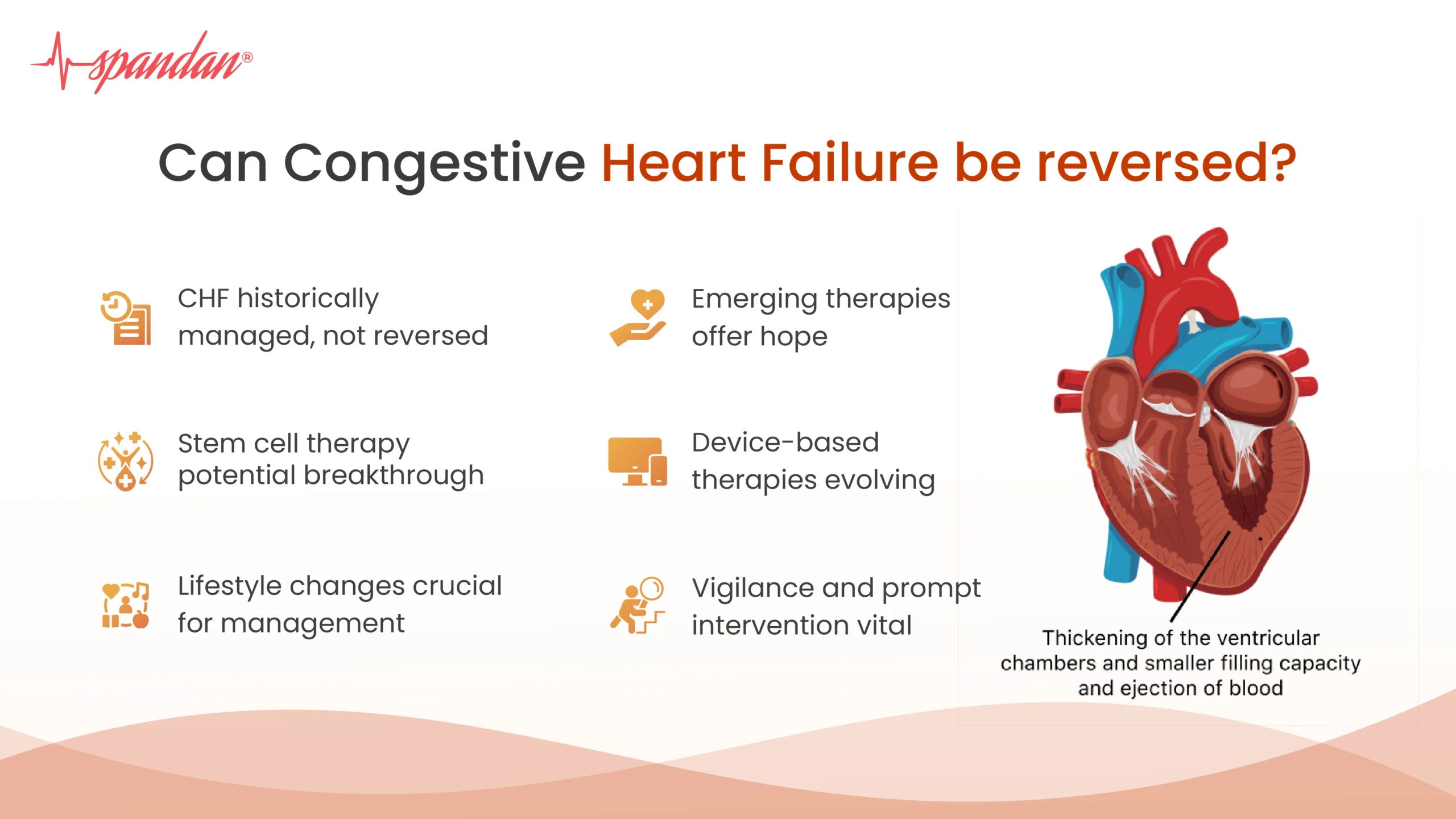
Author:- Mr. Ritesh Sharma
Ever wondered whether can congestive heart failure be reserved? Congestive Heart Failure (CHF) is a menacing condition affecting millions worldwide. It’s characterized by the heart’s inability to pump blood efficiently, leading to symptoms like shortness of breath, fatigue, and fluid retention. If we go by the historical context, congestive heart failure is considered to be an irreversible condition, leaving patients deprived of any possible treatment. Therefore, if this is to be considered, the question of whether can congestive heart failure be reversed holds no merit whatsoever.
However, as the legend says, history can be changed by scientific innovations. The advancements in medical science and a deeper understanding of cardiac physiology have sparked hope that perhaps, just perhaps, congestive heart failure could be reversed. But is it actually possible? Can an irreversible thing like congestive heart failure that has plagued healthcare professionals and scientists alike be actually reversed?
This is a question worth pondering. There we will examine the question: can congestive heart failure be reserved? in the entirety of this blog. So, healthcare professionals and general people alike who would like to know whether can congestive heart failure be reserved going against the historical context will get worthy information from this blog.
What is Congestive Heart Failure?
To comprehend the potential for reversing congestive heart failure, we must first grasp its underlying mechanisms. At its core, congestive heart failure is often a consequence of other cardiovascular conditions, such as coronary artery disease, hypertension, or valvular heart disease. These conditions impose an increased workload on the heart, causing it to weaken over time.
As the heart weakens, it struggles to pump blood effectively, leading to congestion in the lungs and peripheral tissues. This congestion manifests as fluid retention (edema) and impaired oxygen delivery, contributing to the hallmark symptoms of congestive heart failure.
Can Congestive Heart Failure be reversed?
Now, let’s dive into the all-important question of whether can congestive heart failure be reserved like a cardiac arrhythmia or other heart dysfunctions. For this, we first need to understand the historical management of the medical condition. Historically, the management of congestive heart failure has focused on reducing symptoms and slowing disease progression rather than reversing the condition. Medications like ACE inhibitors, beta-blockers, and diuretics aim to reduce the heart’s workload, alleviate fluid retention, and improve overall cardiac function. Additionally, lifestyle modifications such as dietary changes, exercise, and smoking cessation are recommended to optimize cardiovascular health.
While these interventions have undoubtedly improved outcomes for CHF patients, they fall short of offering a definitive cure. Many individuals with CHF still face a grim prognosis, with limited options beyond symptom management and eventual heart transplantation in severe cases. Therefore, this raises a thought-provoking question of whether can this disease be reserved ever.
Embracing Therapeutic Approaches
Despite the challenges, recent years have witnessed a surge in research aimed at reversing congestive heart failure rather than merely managing its symptoms. One promising avenue is cardiac regenerative medicine, which seeks to repair or replace damaged heart tissue using stem cells, growth factors, or tissue engineering techniques.
Stem cell therapy, in particular, has garnered significant attention for its potential to regenerate myocardium and restore cardiac function. Clinical trials exploring the efficacy of stem cell transplantation in congestive heart failure patients have shown promising results, albeit with varying degrees of success.
Another innovative approach involves targeting the underlying molecular pathways implicated in congestive heart failure pathogenesis. Researchers are investigating novel drug therapies that aim to reverse adverse cardiac remodeling, enhance myocardial contractility, and promote tissue repair.
Furthermore, advancements in device-based therapies, such as left ventricular assist devices (LVADs) and cardiac resynchronization therapy (CRT), offer alternative strategies for managing CHF and potentially reversing its progression in select patients. Therefore, there is a high chance that this will be reversed in the future with the help of these therapeutic approaches.
Challenges and Limitations
Despite the optimism surrounding these emerging therapeutic approaches, several challenges and limitations must be addressed. First and foremost is the heterogeneity of this disease, with diverse etiologies and clinical presentations complicating efforts to develop universal treatment strategies.
Additionally, the optimal timing and patient selection criteria for interventions aimed at reversing congestive heart failure remain unclear. Factors such as disease severity, comorbidities, and individual patient characteristics may influence the likelihood of success and must be carefully considered.
Moreover, the long-term safety and efficacy of novel therapies require rigorous evaluation through well-designed clinical trials. While initial studies may show promise, robust evidence is needed to validate their utility in real-world clinical practice.
The Role of Lifestyle Modifications
While medical interventions and technological advancements hold promise in the quest to reverse congestive heart failure, the importance of lifestyle modifications cannot be overstated. Healthy dietary habits, regular exercise, stress management, and adherence to prescribed medications play a crucial role in optimizing cardiovascular health and supporting the efficacy of therapeutic interventions.
Furthermore, patient education and empowerment are essential components of comprehensive congestive heart failure management, empowering individuals to take an active role in their health and well-being.
In conclusion, while reversing congestive heart failure might not be possible for now, there are many scientific innovations that give a glimmer of optimism to this concern. Although it might not be possible to reverse this like other cardiovascular diseases, you can definitely make some lifestyle changes to minimize its impact. Furthermore, prompt medical intervention when facing any symptoms such as chest pain, heart palpitations, etc is paramount in the case of congestive heart failure. Stay vigilant and stay heart-smart!




